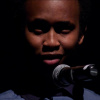A Night With Amanda Black
The success story of a Night With Amanda Black began in 2013 with Amanda Antony posting a video on YouTube dedicating a birthday song to her friend Khanyi. Back then it was only an audience of two. Fast forward four years and on Sunday 20 August she had the Lyric Theatre in Johannesburg bursting at the seams with a full house of fans singing along to all her songs. She might not have won Idols on three separate occasions – coming in at a disappointing sixth in 2015 – but Amanda Black is a South African idol capable of commanding a dedicated cohort of fans.
 Amanda Black
Amanda Black
A red curtain and a vignette-like effect from the spotlight created an air of anticipation that gripped all those waiting to see the starlet in action. Opening act Sjava performed in front of this backdrop – a veil patiently waiting to be flung open to present one of the country’s most talked-about new singers. What was behind there? Lights? A live band or deceitful backtracks? Amanda playing a guitar like she did back in 2013?
Almost all interviews with Amanda Black follow the same angle: The Journey of Amanda Black. Here is an African woman on a voyage of self-discovery. Her position in a male-dominated society and music industry, a crisis with appreciating her blackness and all the pressures of the modern world on a millennial are evident in the presentation of herself to the media and her listeners. From here stems the stage name Amanda Black – a South African superhero who other young people, many of them lost or wandering, can identify with. The Xhosa dots she daubs on her face, backstory, the way she speaks in a gentle yet enthusiastic manner – all these bits of information give us a picture of a generation of young creatives teetering between a rich cultural past and an uncharted future.
The curtain opens to reveal three backing vocalists and six instrumentalists consisting of a percussionist, drummer, bassist, guitarist and two keyboardists. Their names remain unknown throughout the show. They say an instrument is an extension of a musician’s body; this time the musicians were extensions of their instruments. Lights flash and about five flat screens play animations resembling the Windows maze screensaver and random images of wrecked cars, oceans and mountains meant to daze the senses of surfers and hikers. Amanda Black likes nature and Mad Max. Eventually she appears from downstage left, hair a la Grace Jones and sporting a long black dress and an African-print coat. Once she’s on that stage, all those other details – the questionable images on the screens and the lights – seem to dwindle in the background. The audience ruptures into applause, whistling and stomping.
Amanda Black bursts into song as quickly as she stepped onto the stage. She feels it’s necessary to introduce herself after the first song, announcing her arrival and the name of the show: “A Night With Amanda Black. You have to say “A Night With Amanda Black” slowly with a whisper to give the event more weight.
She performed the song ‘Sinazo’ from her debut – and only – album Amazulu, which the whole night was dedicated to. ‘Sinazo’ talks about her late sister. Before launching into the song, Amanda Black says an audience member approached her earlier to say that her father had passed away while she was on her way to the Lyric. She then dedicates ‘Sinazo’ to the fan. One couldn’t help but wonder how someone whose parent has just died can sit in a theatre listening to music. Maybe that’s how some mourn – but not most.
The emotional charge of Amanda Black’s songs makes her a relatable figure. The theme of identity and personal experience that her persona revolves around becomes even more apparent in instances like the aforementioned one. But she lacks in performance. Rigid on stage and employing the same vocal tricks over and over again, Amanda Black still needs to hone her showmanship. With a three-hour stage show split by an intermission, it’s possible that she tries to conserve energy.
She used her entire musical inventory: she did play the guitar to tell us that she’s hasn’t lost the Amanda of 2013 and she featured various guest artists such as the Jaziel Brothers, Sjava and 2015 Idols winner Karabo Mogane.
The two most powerful songs she performed were arguably ‘Phumela’ and ‘Uzothandwa Ndim’, the latter of which she sang live for the first time. ‘Uzothandwa Ndim’ is a dedication to all the women stuck in abusive relationships. Amanda Black opens herself up to them saying she will love them, and their neighbours and friends will love them too.
Despite her affable personality, it is at times difficult to locate the character in her music. Sometimes her voice doesn’t resonate with the songs and it seems like she’s just going through the motions, her voice present but the emotions truant. But all that changes when she has the guitar in her hands. In her stillness her body comes alive, she lifts the heel of her left foot and bends her knee slightly. She converses with the instrument.


















Commentaires
s'identifier or register to post comments